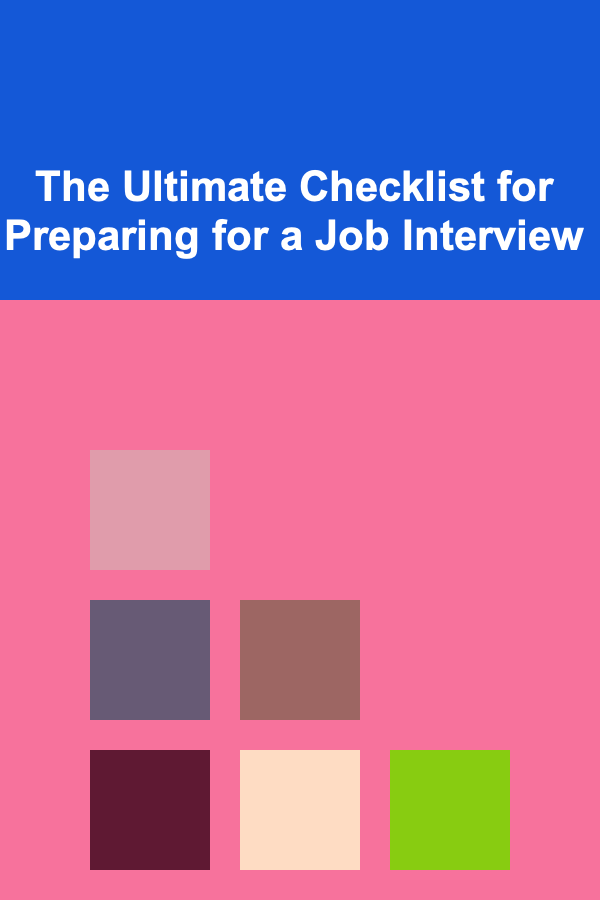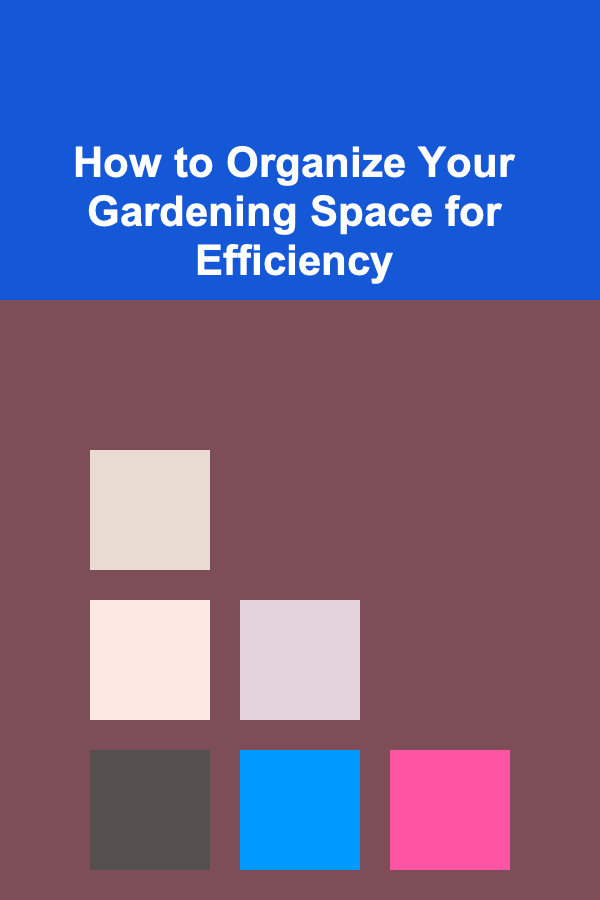
The Ultimate Checklist for Preparing for a Job Interview
ebook include PDF & Audio bundle (Micro Guide)
$12.99$5.99
Limited Time Offer! Order within the next:

Preparing for a job interview can be an overwhelming task, but with the right strategy, you can approach it with confidence and increase your chances of success. A well-prepared candidate is more likely to stand out and leave a lasting impression on the interviewer. This guide will provide you with a comprehensive checklist to help you prepare effectively for your next job interview.
Research the Company Thoroughly
Before you even think about the interview, it's crucial to understand the company you're interviewing with. Employers appreciate candidates who have taken the time to learn about their organization. The more you know, the more you'll be able to tailor your responses and ask insightful questions that demonstrate your genuine interest.
Why This Matters:
- Tailored responses: Understanding the company's culture, products, and goals allows you to answer questions in a way that aligns with their mission and values.
- Shows initiative: Employers love candidates who are proactive and genuinely interested in their company.
Actionable Steps:
- Visit the company's official website and read up on their history, mission, values, and vision.
- Check their social media profiles and any recent press releases or news articles.
- Look at their competitors to understand their position within the industry.
- If possible, research the team you'll be interviewing with, particularly their roles and backgrounds.
Understand the Job Description Inside and Out
Knowing the ins and outs of the job you're applying for is essential to success. This will not only help you in answering the common interview questions but also in assessing whether the job is a good fit for your skills and career goals.
Why This Matters:
- Showcases alignment: By understanding the key responsibilities and qualifications, you can highlight your relevant experiences and skills.
- Identifies areas of strength: Recognizing the job's requirements lets you focus on areas where you excel, ensuring you stand out as the ideal candidate.
Actionable Steps:
- Carefully read the job description and make a list of the key skills and qualifications.
- Match the job requirements with your experience and qualifications.
- Prepare specific examples from your past work that demonstrate you have the skills they're looking for.
Prepare Your Resume and Portfolio
Your resume is your marketing tool during the interview, and it needs to reflect your best self. You should always bring a few copies of your resume to the interview, as well as a portfolio if relevant to the role.
Why This Matters:
- Clear presentation: A well-prepared resume reinforces the points you want to highlight during the interview.
- Professionalism: Having a neatly organized portfolio or samples of your work shows that you take your career seriously.
Actionable Steps:
- Print a few copies of your updated resume to bring with you, especially if you are meeting with multiple interviewers.
- Ensure your resume is tailored to the role by emphasizing relevant skills, experiences, and accomplishments.
- If you have a portfolio (for design, writing, marketing, etc.), ensure it's organized, updated, and ready to present.
- Consider organizing your work samples digitally if they're difficult to present physically.
Dress Appropriately for the Role and Company Culture
The way you present yourself in an interview sends a clear message about your professionalism and how seriously you take the opportunity. While different industries have varying dress codes, it's always best to err on the side of being slightly overdressed than underdressed.
Why This Matters:
- Creates a strong first impression: Your appearance can influence how you are perceived during the first moments of your interview.
- Respects the company culture: Dressing according to the company's expectations shows that you understand their environment and are serious about the opportunity.
Actionable Steps:
- Research the company's dress code by looking at photos of employees or checking their social media.
- For conservative industries (e.g., law, finance), opt for formal business attire, such as a suit or professional dress.
- For creative industries (e.g., tech, design), business casual is often acceptable, but still aim for neat, professional attire.
- Make sure your clothes are clean, wrinkle-free, and fit well. Pay attention to your grooming as well---clean hair, nails, and minimal accessories.
Practice Your Answers to Common Interview Questions
Although you can't predict every question, many interviews follow a predictable pattern. By preparing and practicing answers to common interview questions, you'll be better equipped to answer them confidently and clearly.
Why This Matters:
- Boosts confidence: The more you practice, the more comfortable and confident you will feel during the interview.
- Ensures clarity: Practice helps you avoid rambling or getting off-topic, leading to more concise and impactful responses.
Actionable Steps:
- Review typical interview questions such as:
- "Tell me about yourself."
- "Why do you want to work here?"
- "What are your strengths and weaknesses?"
- "Tell me about a time you faced a challenge at work."
- Practice your responses out loud, focusing on clear, confident delivery.
- Use the STAR method (Situation, Task, Action, Result) for behavioral questions to provide structured and effective answers.
- Record yourself answering questions to evaluate your tone, body language, and overall delivery.
Prepare Questions for the Interviewer
Interviews are a two-way street. While you'll be answering questions, it's equally important to ask your own. Thoughtful questions show that you're interested in the company, the role, and the team dynamics.
Why This Matters:
- Shows interest: Asking questions demonstrates that you're considering how you would fit into the organization.
- Evaluates fit: The questions you ask help you assess whether the company's values and work culture align with your expectations.
Actionable Steps:
- Ask about the company's culture and values.
- Inquire about the team structure and dynamics, as well as potential career growth opportunities.
- Ask about specific projects you might work on or the challenges the company is currently facing.
- Be mindful not to ask questions that are answered easily on the company's website or in the job description.
Prepare Mentally and Physically
Interviews require mental clarity and physical stamina, so it's important to take care of yourself leading up to the big day.
Why This Matters:
- Reduces stress: Adequate preparation helps ease anxiety and puts you in a positive mindset.
- Enhances performance: A clear, rested mind will help you think quickly and perform your best during the interview.
Actionable Steps:
- Get a good night's sleep before the interview to ensure you're well-rested.
- Eat a nutritious meal before the interview to maintain your energy levels.
- Practice relaxation techniques such as deep breathing to stay calm and focused.
- Avoid last-minute cramming or over-studying the night before. Instead, focus on confidence-building exercises and positive self-talk.
Prepare for Virtual Interviews
As remote work becomes more common, virtual interviews are increasingly popular. These require some specific preparation to ensure everything goes smoothly.
Why This Matters:
- Avoids technical issues: Virtual interviews require reliable technology and an understanding of how to use it effectively.
- Creates a professional environment: The setting of your virtual interview can influence how the interviewer perceives you.
Actionable Steps:
- Test your technology (internet connection, webcam, microphone, etc.) ahead of time.
- Choose a quiet, well-lit location for the interview with minimal distractions.
- Dress professionally as you would for an in-person interview, even if it's a video call.
- Practice using the virtual platform (Zoom, Skype, etc.) and familiarize yourself with its features.
Follow Up After the Interview
Sending a follow-up email is an essential part of the interview process. It shows appreciation for the opportunity and reinforces your interest in the role.
Why This Matters:
- Demonstrates professionalism: A thoughtful follow-up shows that you value the time the interviewer spent with you.
- Keeps you top of mind: With many candidates being interviewed, a follow-up can help keep you in the interviewer's memory.
Actionable Steps:
- Send a thank-you email within 24 hours of the interview.
- Express your appreciation for the interviewer's time and reiterate your enthusiasm for the role.
- If appropriate, mention something specific from the interview that further solidifies your fit for the role.
Conclusion
Preparing for a job interview is more than just answering questions; it's about showcasing your qualifications, demonstrating your interest in the company, and making a lasting impression. By following this comprehensive checklist, you'll increase your chances of standing out from the competition and securing the job you want. With thorough preparation, you'll enter your interview with confidence, ready to make the best possible impression.

How to Build a Checklist for Electrical and Plumbing Renovation
Read More
How to Build a DIY Soundproof Booth in Your Home
Read More
How to Conduct a Personal Finance Analysis for Better Financial Health
Read More
How to Organize Your Gardening Space for Efficiency
Read More
How to Profit from Deep Learning by Creating Custom AI Tools
Read More
Thrifty Ideas for Home and Lifestyle: Save More While Living Better
Read MoreOther Products

How to Build a Checklist for Electrical and Plumbing Renovation
Read More
How to Build a DIY Soundproof Booth in Your Home
Read More
How to Conduct a Personal Finance Analysis for Better Financial Health
Read More
How to Organize Your Gardening Space for Efficiency
Read More
How to Profit from Deep Learning by Creating Custom AI Tools
Read More